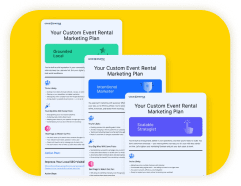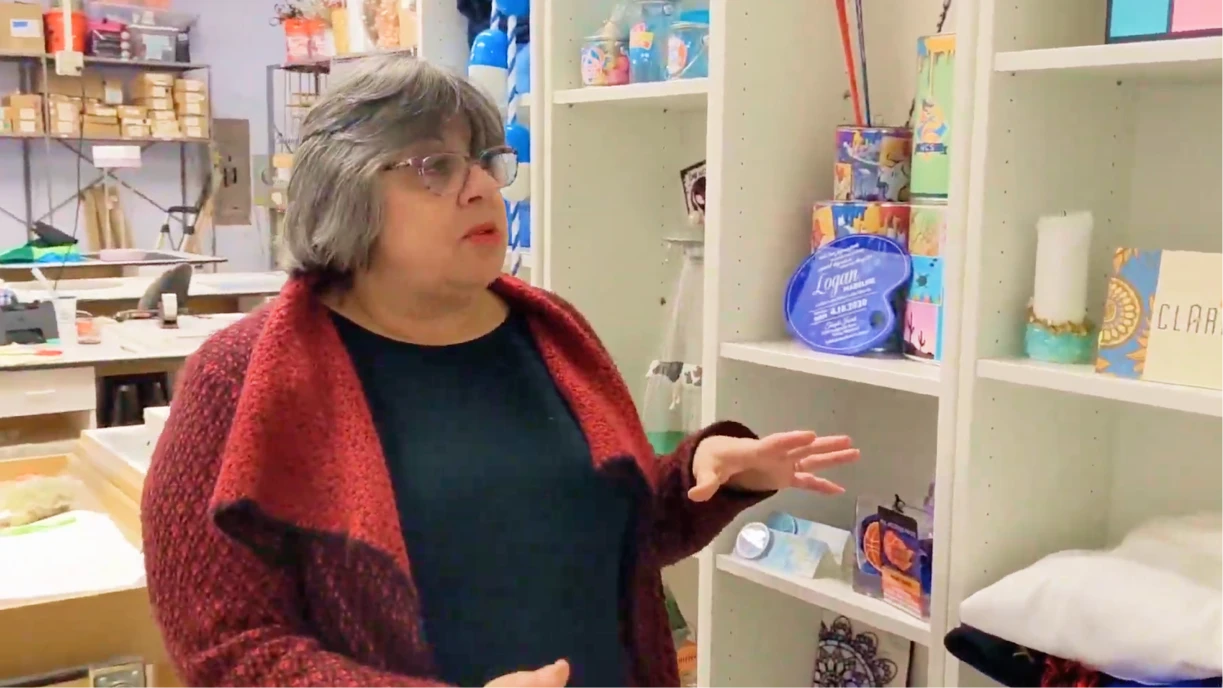As an event professional, you know your way around a floorplan, can build a timeline from scratch, and aren’t afraid to talk design trends. As a business owner, you know you need to successfully market your services. And as a smart and clever person, I bet you’ve done your research online, looking for the best, easiest, and most effective ways to market your business. That’s probably what brought you here to this article.
From the best platforms to the right messaging, many creatives look to others for advice, recommendations, and inspiration. But are you always getting the best information?
Let’s face it, online marketing celebrities love to tout that next super-simple solution based on their own experience, but is that advice truly right for you?
Figuring out what works for your business can become overwhelming. When you’re overwhelmed by online marketing advice and worried your competition is gobbling up market share, it may seem easier to simply copy what competitors and influencers are doing.
But the real truth is: You don’t know if what they are doing actually works – for them or for you. At best, a copycat approach will make you look like the second-best version of your competition. At worse, you could damage your reputation by copying content and branding that isn’t authentic. Both scenarios can lead to nightmare clients and getting compared to competitors on price alone.
Fortunately, there is a quick and easy way to rise above the noise and kick marketing overwhelm to the curb. It’s as simple as listening to what your clients are saying — the real clients and not your ICA (Imaginary Client Avatar).
When you take the time to collect feedback in an organized manner, you will get insights that lead to stronger and more authentic messaging. The best part? Your competition will have a hard time copying you effectively.
Use these three simple research strategies to create a better marketing strategy that eliminates overwhelm and helps you show up with authenticity and verve.
First, audit your reviews (all of them!).
Client reviews offer a goldmine of insights about a business’s strengths and weaknesses, how clients experience your services, and how your business and brand are perceived in the market. While it’s fun and affirming to get positive feedback, in order to get the real stuff, you must assess feedback across the spectrum — the good, the bad, and the ugly.
It’s easy to read a few five-star reviews and pat yourself on the back for a job well done, but the critical feedback is ultimately where you’ll see the greatest opportunity for growth. Negative reviews signal areas that need correcting and prevent you from bragging about attributes that don’t ring true with your audience.
No negative comments or reviews? No problem. Survey your past clients and ask them how you could have made their experience even better.
Once you’ve gathered your review and survey data, note any patterns that arise, both positive and negative. Ask yourself the following questions to find patterns and deepen your insights:
- What are the 2-3 things that most clients rave about?
- How did you make your clients feel during the process?
- How did your clients feel at their event because of the work you did?
- What challenges did they face while doing business with you?
- What are 1-2 things you can improve upon?
Then, evaluate your top competitors’ reviews.
Once you’re clear on your business’s strengths and weaknesses, do the same with your top three competitors. Check out their online reviews just as you did your own. You’re looking for both similarities and differences.
Determine what you all need to do to attract and book clients. If you are a planner or designer, you and your competition must both be organized with keen attention to detail. If you’re a DJ or band, you need to be able to get everyone on the dance floor to party. While not a competitive advantage one way or the other, it’s necessary to talk about and demonstrate basic competence.
Be honest about what your competition does well. If there are things that your competition does well but you’ve gotten negative feedback on, let them own it! If they get rave reviews for things you don’t like (or aren’t great at), allow them to have that space. Remember: You don’t have to be everything for all people. These differences help your ideal clients find you, while their ideal clients can find them. There is more than enough to go around.
And finally, don’t be shy about owning your magic. Pay close attention to the areas you’re strong and they aren’t. This is your marketing magic (aka your competitive advantage). When you highlight what only you are truly great at, you stand out with offers and brand promises no one else can claim.
Bonus tip: If you don’t think you have competition because your service is hyper-niche, think again! Consider where your potential customers would turn if your business didn’t exist, and start there.
Finally, focus on the magic — and lean into it.
Remember your marketing magic (aka your competitive advantage)? That’s the secret to content marketing success, so use it. Pick two or three winning qualities you’re known for and start talking about them on social media at least once a week. These are your superpowers, telling potential clients how you’ll swoop in to save the day.
You’ll also need to speak to the characteristics you and your competitors share — your market parity. These typically aren’t “special” but they keep clients satisfied, so you have to talk about them! For example, if you are an event planner, you must be detail-oriented and able to stay on budget. While it may not set you apart from others, it shows your audience that you measure up in the vital areas in addition to shining in your own ways.
If you notice market perception doesn’t align with how you want your brand presented, start incorporating some behind-the-scenes content and client stories that support your goals. For instance, if you want to be known for having a fun, easygoing experience, produce content that makes it clear what it’s like to work with you!
An effective marketing strategy requires more than a steady flow of content. To achieve success, you must build upon a solid foundation of market research to identify what your audience loves about your brand.
Only then can you establish credibility with consistent messaging across your online presence — from your website and social media to your online reviews. And when you’re authentic and true to your brand values, nobody can replicate your superpowers!
Want more bookings?
Take our free quiz to get a custom marketing game plan in minutes.







